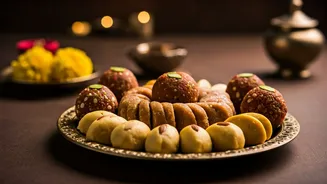Diwali Sweet Concerns
The Diwali festival, a time for joyous celebrations, also brings a wave of traditional sweets that often raise health concerns. These sweets are frequently
loaded with excessive sugar, unhealthy fats, and processed ingredients. Their consumption can lead to weight gain, and spike blood sugar levels. Many traditional recipes use large quantities of ghee, and refined flours, amplifying the negative impact. This scenario necessitates a closer examination of what we consume during Diwali and encourages a shift towards a more balanced approach to the festivities. The intent is to enjoy the spirit of the celebrations while safeguarding one's health.
Expert Dietary Recommendations
Nutritionists strongly advise careful consideration of dietary choices during Diwali. The key recommendation is moderation. Enjoying sweets in smaller portions is critical. Instead of indulging in large quantities, the focus should be on savoring each bite. They also propose an emphasis on homemade sweets to control ingredients. Making sweets at home enables individuals to tweak recipes, swapping unhealthy components with healthier options. Another key point is to increase intake of water and dietary fibre. This aids in digestion and helps balance the effects of sugary treats, so staying hydrated and including fibre-rich foods like fruits and vegetables is important. Additionally, nutritionists suggest to plan and prepare ahead. This will enable individuals to create balanced meals and snack options that promote well-being throughout the festival. The goal is to avoid overindulgence and maintain healthy eating habits, even during the festive season.
Healthier Sweet Substitutions
Embracing healthier swaps for traditional ingredients makes a significant difference. Refined sugar can be substituted with natural sweeteners like jaggery or dates. These alternatives, while still sweet, offer some added nutritional value and cause a slower blood sugar rise. White flour can be substituted with whole-wheat flour, or alternatives like almond flour. Using these options increases the fibre content of the sweets. Healthy fats, such as ghee, can be substituted with small amounts of healthy fats like nuts and seeds. They offer a dose of essential nutrients. One can incorporate fruits, as they add natural sweetness and texture to the dishes. They provide fibre and vitamins. By adopting these substitutions, individuals can create lighter, nutritious versions of classic Diwali sweets without sacrificing the festive taste. These swaps contribute to a more balanced and mindful eating approach during the holiday.
Mindful Eating Practices
Besides recipe modifications, the approach to eating is crucial. Practicing mindful eating encourages savoring each bite. It helps to understand hunger cues and avoid overeating. Slowing down while eating and focusing on the flavors and textures of sweets can greatly reduce the risk of overconsumption. Portion control is also important. Deciding the quantity to consume and sticking to the set amount assists in avoiding excessive intake. Drinking water before eating sweet dishes assists in reducing hunger. Water also supports digestion and helps maintain balanced sugar levels. Eating meals at scheduled times is also significant. Maintaining a regular meal schedule helps prevent cravings for sweets. Planning and preparing meals in advance can assist in making healthy choices. By incorporating these mindful eating practices, individuals can fully participate in the festivities without sacrificing their health goals. The focus remains on making informed and enjoyable food choices.
Recipe Adaptations
Transforming classic recipes to include healthier elements involves several adjustments. When preparing ladoos, substitute sugar with jaggery or dates. Include nuts and seeds for a crunchy texture and nutrients. For barfis, reduce ghee and substitute refined flour with a mixture of whole wheat and almond flour. Incorporate a fruit puree like mango or strawberry for extra flavor. Instead of frying, baking or air frying, sweets can cut down on excessive fat. In preparation of payasam, use low-fat milk, and replace sugar with natural sweeteners. Consider adding cardamom or saffron for enhanced flavor. Always measure portions carefully to reduce overconsumption. These recipe adaptations demonstrate how to make traditional Diwali sweets healthier without affecting the celebratory spirit. The aim is to savor delicious sweets while considering dietary requirements.
Festive Health Strategies
Alongside the choice of sweets, other factors play a crucial role in maintaining health during Diwali. Incorporating regular physical activity, like a morning walk or yoga, is crucial to help burn off extra calories consumed during the festivities. Make sure to stay hydrated by drinking plenty of water throughout the day to support metabolism and aid digestion. Getting enough sleep is also essential to maintaining overall health, so ensure you get the recommended hours. Managing stress will also assist your body in remaining healthy. During festivals, the festive rush can cause stress. Therefore, it is important to practice relaxation exercises. Choosing a balanced diet with vegetables and fruits besides sweets also promotes overall well-being. By integrating these strategies, individuals can enjoy a healthy and happy Diwali. The focus is to celebrate the festivities while prioritizing health.












